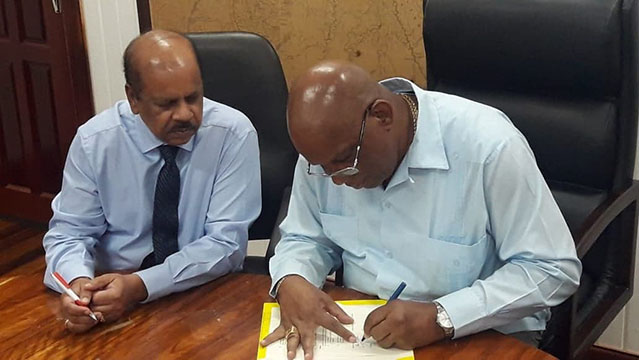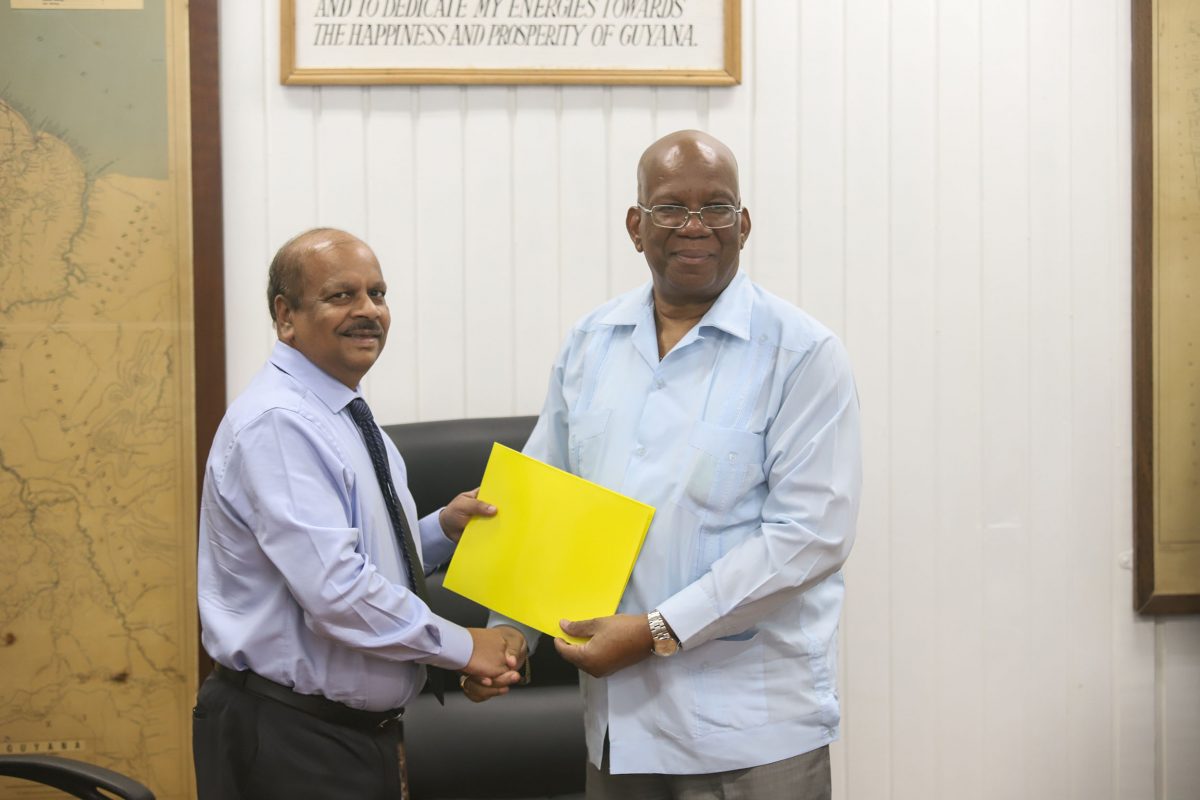The Ministry of Finance and the Bank of Guyana (BoG) yesterday signed a pact which brings closer the operationalisation of the Natural Resource Fund, which is to receive oil revenues, a move hailed by government as demonstrative of its transparency in the management of the oil and gas sector.
“Because it is one more piece of evidence as we bring transparency and accountability to the people,” Minister of Finance Winston Jordan yesterday told reporters at the signing of the Memorandum of Understanding (MoU) at his ministry’s Main Street office.
“This MoU will clear any doubts. Everything is right in here,” he added, holding up the document which he said will be accessible on both the BoG and Ministry of Finance’s websites. The minister pointed to a statement which, he said, explains the processes and reason behind government’s decision.

“This Agreement sets forth the obligations of the Bank of Guyana as the operational manager of the NRF, which include: 1) receiving and accounting for all deposits into the NRF; 2) investing the NRF In eligible asset classes; 3) appointing private managers and custodians; 4) reporting on the performance of the NRF on a monthly, quarterly and annual basis; 5) implementing management systems, procedures and risk management arrangements in accordance with international standards; and, 6) providing the public with information on the NRF as required by law; among others,” the statement, issued by the Finance Ministry after the signing of the MoU, said.
“The Agreement, which will be published on the ministry’s website in accordance with Section 42 of the NRF Act, also includes the obligations of the Minister of Finance as the overall manager of the NRF that will allow for the effective operational management of the NRF by the Bank of Guyana. Additionally, the Agreement identifies certain principles for the operational management of the NRF to ensure transparency and accountability. Other important aspects of the Agreement include the fees to be charged by the Bank of Guyana, procedures for the appointment of private managers and custodians, and the liability for losses that may occur,” it added.
‘Safest place’
Jordan explained that funds will be held with the Federal Reserve System of the United States, at its Federal Reserve Bank of New York, pending the American bank’s due diligence and approval, as government believes it is the safest places to keep the money, while it earns interest.
Guyana has been using the Federal Reserve System of the United States since independence, according to Governor of the BoG Gobind Ganga. “That is one of the safest institutions you could ever deal with. It’s over 50 years we’ve been dealing with the Federal Reserve [of the U.S],” Ganga said.
“All of the reserves of the Bank of Guyana are not held in the Bank of Guyana, they are held in [an] offline account in the Federal Reserve. If they were held in the Bank of Guyana, they will never make a cent interest,” Jordan added.
Last Wednesday, Jordan had revealed that Guyana’s oil revenues will be held in the NY Federal Reserve Bank.
“We are in the process of getting the requirement to have the account established,” Jordan had stated during an interview with the Department of Public Information. He had said that once “parked” in the account, these funds will await a new Parliament to decide on spending.
He later explained that in keeping with the provisions of the Natural Resource Fund Act, the funds are to be “held outside of Guyana” but managed by the BoG.
“The Bank of Guyana is the owner of the fund,” Ganga emphasised yesterday.
The statement issued after the signing of the MoU noted that as part of government’s preparations towards becoming a petroleum producing country and in anticipation of first oil in 2020, work commenced in earnest in 2017 on the drafting and consultations regarding the development of a Sovereign Wealth Fund (SWF) legislation for Guyana. It observed that countries with such funds determine the scope and objectives based on national development priorities and the Santiago Principles. The better managed of these funds have benefited from a core of competent professionals, effective and robust institutional mechanisms and transparent management and reporting mechanisms, the ministry said.
“In Guyana’s case, after several rounds of internal consultations, international expert consultations, examination of other country experiences and drafting support, particularly from the Commonwealth Secretariat, an initial draft legislation was developed,” it said. According to the statement, in an effort to ensure awareness and secure public feedback on the content of a potential SWF, President David Granger requested the development of a Green Paper to be laid in Parliament. Titled ‘Managing Future Petroleum Revenues and Establishment of a Fiscal Rule and a Sovereign Wealth Fund’, the green paper was published in August 2018.
“This supported wider stakeholder consultations with the private sector and civil society as well as international agencies and experts. Based on the feedback and comments received [from] our private sector groups and civil society engagements, the Natural Resource Fund (NRF) Bill No. 14 of 2018 was tabled in Parliament on November 15, 2018 and assented to on January 23rd, 2019 – making the Cooperative Republic of Guyana one of the few countries in the world to have developed this type of legislation ahead of first oil,” the statement said.
The ministry pointed to features of the NRF Act, which it hailed as landmark, saying that it was crafted under similar principles to the Norway model. It includes a withdrawal rule that permits a flow of funds from the NRF into the national budget that is formula based; and, a design to achieve multiple objectives of: reducing the transfer of the volatility of oil prices and production into the economy; meeting the immediate and urgent development expenditure needs of the country; and intergenerational savings to ensure that the benefits of oil extraction are shared across both current and future generations.
“In order to ensure those savings are wisely and safely held and invested, the NRF Act of 2019 stipulates the mechanisms under which revenues will be deposited and how investments are to be conducted, including the eligible investments allowable,” the statement observed.
“The Bank of Guyana has been mandated by the NRF Act to ensure that the NRF is managed prudently. Other countries that have similar funds managed by their Central Banks include Norway, Chile and Botswana. The inflows to the NRF will be in United States of America Dollars which will be deposited in US bank accounts held by the Bank of Guyana. It is important to note that most central banks and SWFs manage reserves by holding them in foreign denominated currencies outside of their jurisdiction. In preparation for its role as operational manager of the NRF, the Bank of Guyana has begun building additional capacity, supported by the World Bank’s Reserves Advisory and Management Programme (RAMP), with whom an agreement was signed on October 1, 2019,” the ministry noted.
And while neither the opposition nor private sector has nominated anyone to the required committees, Jordan said that this will not hinder collection of revenues and saving.
He pointed out that the Act provides for the appointment of three committees: the macro-economic committee, the investment committee and the oversight committee, and informed that none had yet been established. However, the ministry has been internally working on a possible payment scale and shortlisting of names of persons to be appointed to two committees – the macro-economic and investment committees, but payment would have to be approved by government.
“We had written both the opposition and the PSC. The opposition claimed they didn’t recognise us as government and the PSC said they didn’t receive the correspondence,” he said.
“But that will not affect the planning for the investment,” he added.





